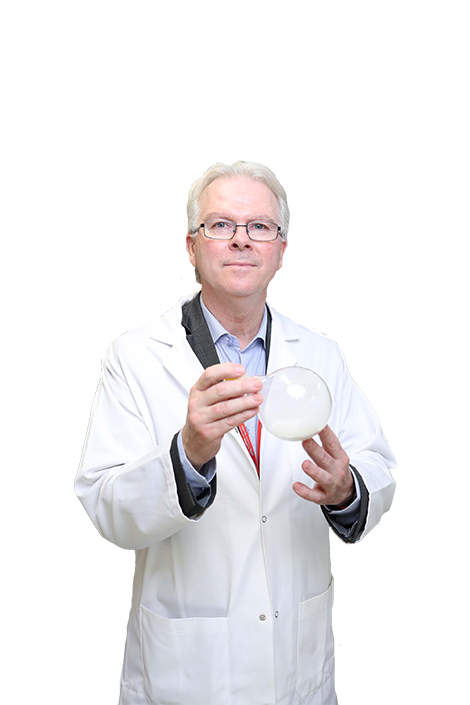Translating research into tangible benefits
The term ‘translational research’ is often used interchangeably with ‘translational medicine’, or ‘translational science’, or ‘bench to bedside’.
The term translational refers to the ‘translation’ of basic scientific findings in a laboratory setting into new ways to fight disease.
Our researchers identify opportunities that can lead to new diagnostics, drugs and vaccines, translating research into tangible benefits for the global community.
Our goal
From the laboratory bench to the patient’s bedside, translational outcomes are the ultimate goal of the Institute for Glycomics.

Translational outcomes
Translational research may lead to a better understanding of disease or identify new ways to treat, prevent or diagnose disease to enhance human health and wellbeing. This involves applying laboratory-based discoveries to clinical studies (bench to bedside) and can ultimately result in the production of a new treatment/diagnostic test which can be used in clinical and community settings. It can often take many years for a laboratory discovery to be tested and if found effective, applied into healthcare settings. From the laboratory bench to the patient’s bedside, translational outcomes are the ultimate goal of the Institute for Glycomics. With a track record of taking technologies to market and leadership focused on translational science, we have no doubt that we will be successful in discovering and developing the next generation of biomedical solutions.
Critical to delivering blockbuster technologies are two key factors:
- Providing outstanding infrastructure
- Assembling the brightest scientific minds through strategic appointments of research leaders of international standing, who demonstrate excellence in fundamental science while delivering commercial outcomes through translational science.
Success Stories
Experimental drug for sepsis in human clinical trials
A new experimental drug to treat sepsis has now entered the next stage of clinical trials in patients in Australia after successfully completing Phase 1a trials in healthy volunteers.
A new drug to cure parainfluenza
The Institute for Glycomics has partnered with Hong Kong listed China Grand Pharma’s newly established Australian company Grand Medical Ltd to develop a new drug for Human Parainfluenza Virus.
The Malaria Vaccine Project
A malaria vaccine candidate to protect against all known strains of the deadly disease is currently in human clinical trials.
New hope for treatment of Hand, Foot and Mouth Disease
A new scientific discovery, thanks to one of the research groups at the Institute for Glycomics, is providing new hope for the development of an effective treatment of Hand, Foot and Mouth Disease.
New blood test to detect early stage ovarian cancer
Research on a bacterial toxin has led to the development a new blood test for the potential early diagnosis of ovarian cancer.
Potential vaccine treats and prevents deadly streptococcal toxic shock
A new vaccine developed by Griffith University Institute for Glycomics researchers has the potential to treat and prevent toxic shock caused by invasive streptococcal disease, which kills more than 160,000 people every year.
New treatments with potential to prevent and cure gonorrhoea in women
A team of researchers from Griffith University and the Abigail Wexner Research Institute at Nationwide Children’s Hospital in Ohio have discovered two new treatments that have the potential to prevent and cure gonorrhoea.
New treatment for viral arthritis in human clinical trials
Griffith University’s Institute for Glycomics and Melbourne-based company Paradigm Biopharmaceuticals Limited have reported impressive results from their Phase 2A clinical trials of a new drug candidate to treat viral arthritis caused by mosquito-borne alphavirus infections, including the debilitating Ross River virus (RRV) and chikungunya virus (CHIKV).
Clinical studies
Translational clinical studies, including clinical trials, allow the testing of laboratory-based findings in individuals who have volunteered to participate in that trial. There are different types of studies that may be undertaken depending on the aim of the research and these can include: collecting and analysing samples from individuals with a specific disease, examining the performance and effectiveness of new diagnostic tests and clinical trials which aim to assess the effectiveness of a new intervention eg an experimental drug or vaccine.
When a new intervention is being developed, early exploratory or pilot studies (sometimes referred to as phase 0 trials) may be conducted. This typically involves examining the intervention e.g. an experimental drug or a vaccine in a small number of volunteers over a limited time period.
Following this, clinical trials normally progress through four stages:
Phase I clinical trial
Tests a new intervention in a small number of volunteers (eg 20–80) to evaluate safety and tolerability (e.g. identify side effects and establish a safe dosage range, if required).
Phase II clinical trial
Evaluates the intervention in a larger group of volunteers (several hundred) to determine if it is effective and to gather additional safety information.
Phase III clinical trial
Examines the effectiveness of the intervention in larger groups of volunteers (several hundred to several thousand) by comparing it with no treatment or with other standard or experimental treatments. Side effects are also examined to gather additional safety information in a larger group of people.
Phase IV clinical trial
These are normally conducted after the intervention has been marketed. These studies monitor the effectiveness of the intervention in the general population and continue to collect information about side effects over a longer period of time. If the new intervention/diagnostic test performs well in Clinical Trials, it needs to be approved by the government before it is available for use in the general population. In Australia, new interventions and treatments are approved by the Therapeutic Goods Administration.